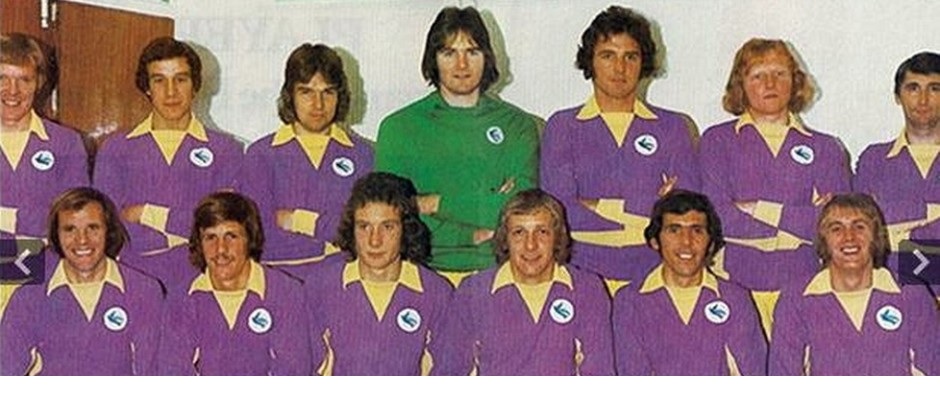
It’s still less than a month from what I’d call the season’s low point, the Boxing Day disaster at Oxford. At that time, the pundits were saying, as most of them are still doing, that Hull and Luton would get their act together and pull clear of trouble If you believed that, then as you looked at the table that day, it was hard to see three teams that we, realistically, had a chance of finishing above.
It seemed that us, and the likes of Portsmouth and Plymouth, really needed a team seemingly looking safe in mid table to have a bit of a nightmare run to increase the number of teams who could be classed as relegation candidates.
Four weeks on, Luton, if anything, have got worse, Hull have had some better results but are still down there and, although Mark Robins has made Stoke harder to beat, a run of one win in fourteen has dragged them into things.
However, it is Derby County, who were nine points in front of us after the boxing Day fixtures, that have become the seemingly safe team to suddenly have to accept that, Plymouth apart, they’re as likely as anyone to go down.
I mentioned Stoke’s struggle to find a winning formula, well, despite the unbeaten run of seven games in all competitions which would have looked impossible to achieve to anyone who saw us playing at Oxford, we’ve only won two out of our last fifteen league games, yet that has been enough to ensure that in midweek we moved above Derby for the first time this season.
Five straight losses, plus an FA Cup defeat on penalties at Leyton Orient, have seen Derby plummet down the table with their cause not being helped by injuries to their three senior centrebacks (former City man Curtis Nelson is out for the season) which saw them having to field a makeshift back three for the home game with Sunderland in midweek.
On the face of it then, it looks like we should be winning the game at Cardiff City Stadium tomorrow where we look for revenge for the 1-0 away loss in September. However, let’s not forget that in November we suffered three straight home defeats to sides which were regarded as being right out of form. Blackburn, QPR and Preston all came here and won by two goal margins in games where we could have few complaints about the outcome.
Those results, together with the Championship’s habit of producing a couple of what used to be called coupon busting results every week means that City have absolutely no right to have even a hint of complacency going into tomorrow’s game – the last few weeks have been encouraging, but lose tomorrow and we’re very likely to be in the bottom three when we go to Leeds next weekend.
On to the quiz, seven Derby related questions dating back to the sixties with the answers to be posted on here on Sunday.
60s. This forward had a pretty modest career which makes it surprising that he averaged a goal a game in international football, albeit from a very small sample size – indeed, all of his goals came in the one game. In club football, he stayed at his first club, the one which represented his birthplace, for seven years, yet never made it to a hundred league matches for them. However, the contradictory nature of his career is again there, because he managed to score almost forty goals in them. His first transfer rather tells you how far modern day giants had dropped as the fifties made way for the new decade, but, even though they had fallen on relatively hard times, he never got to play a game for them and his Football League career looked to be over as he headed to South Africa for a year. However, he returned to England to play for Derby and made just about enough appearances to take his career total of league game just over the hundred mark – the odd thing was that he’d managed to keep scoring at a rate of nearly one every two games throughout if you threw in his international games as well. Who am I describing?
70s. This Yorkshireman scored on his league debut in a win over the Liverpool team that would win the European Cup that year. He played for Derby and City, but had most success at a place named after discoloured water, but, after his most successful scoring season, he rather put through his own net, by, first, demanding a transfer and then, effectively, going on strike as far as first team consideration was concerned. This resulted in him spending a season in the reserve team and there was an inevitable parting of the ways in the summer when he signed up for a side which may have played in an orchard (not the apple type), but didn’t in real life. The truth was that his best days were over by the time he was twenty one, his time at City is barely remembered now (he scored once for us) and, after he left us, he first played one game for a non league Yorkshire holiday resort before returning to what is now called the EFL to make his way diagonally down England, starting off at a ground which once saw one of the World Cup’s biggest ever shocks, then to Milliners, before finishing up with southern birds. The measure of his rapid decline from what was a high of twenty plus goals in a season in the third tier could be gauged by the fact that he never made it into double figures for league appearances at any of his last five clubs. Can you name him?
80s. Is it vain to depend on one time City midfielder at beginning of year? (5,6)
90s. Which Derby captain of this decade had three spells playing at a club where he won a European Cup Winners Medal, played abroad for a while for The Cockerels and scored two goals for England?
00s. Motown superstars combine to provide lower leagues journeyman who started at Derby, played for twenty three clubs and was once loaned by Oxford to Cambridge!
10s. Manchester Indie rock meets Tulsa pop rock?
20s. Ordinary, but mad, tradesperson?
Answers
60s.Swansea born Des Palmer scored a hat trick for Wales against East Germany to give him a goal a game record from his three international caps. He also managed thirty eight goals from eighty four league appearances for the jacks before signing for Liverpool in 1959. A year later he was off to South Africa, but signed for Derby within another year, scoring six times for them in eighteen games in the 61/62 season.
70s. Andy Crawford scored on his Derby debut in a 4-2 win over Liverpool in 1978, but it was when he signed for Blackburn that he made most impact, scoring twenty three goals in. all competitions in 80/81 as Rovers won promotion to the old Second Division. Garner then demanded a move and went on strike when one was not forthcoming. Eventually signing for Bournemouth, he was released by them after two seasons. He then signed for City for the start of the 83/84 campaign, but only scored one goal, against Grimsby, in six appearances before leaving – after that he went on to play for Scarborough, Middlesbrough (North Korea beat Italy 1-0 at Ayresome Park in the 1966 World Cup), Stockport and Torquay.
80s. David Penney.
90s. Gordon Cowans scored twice in ten games for England, won the European Cup with Aston Villa and played in Italy for Bari (the Cockerels) – he was captain of Derby in 93/94.
00s. Marvin (Gaye) (Smokey) Robinson scored once in a dozen league games for Derby at the start of a career which could have been that of the original lower league journeyman.
10s. James Hanson was in the Derby midfield when they beat us 3-1 in 2018 in the rearranged game where a very, very localised snowstorm in the Derby area caused a postponement of the original fixture.
20s. Joe Wildsmith.



